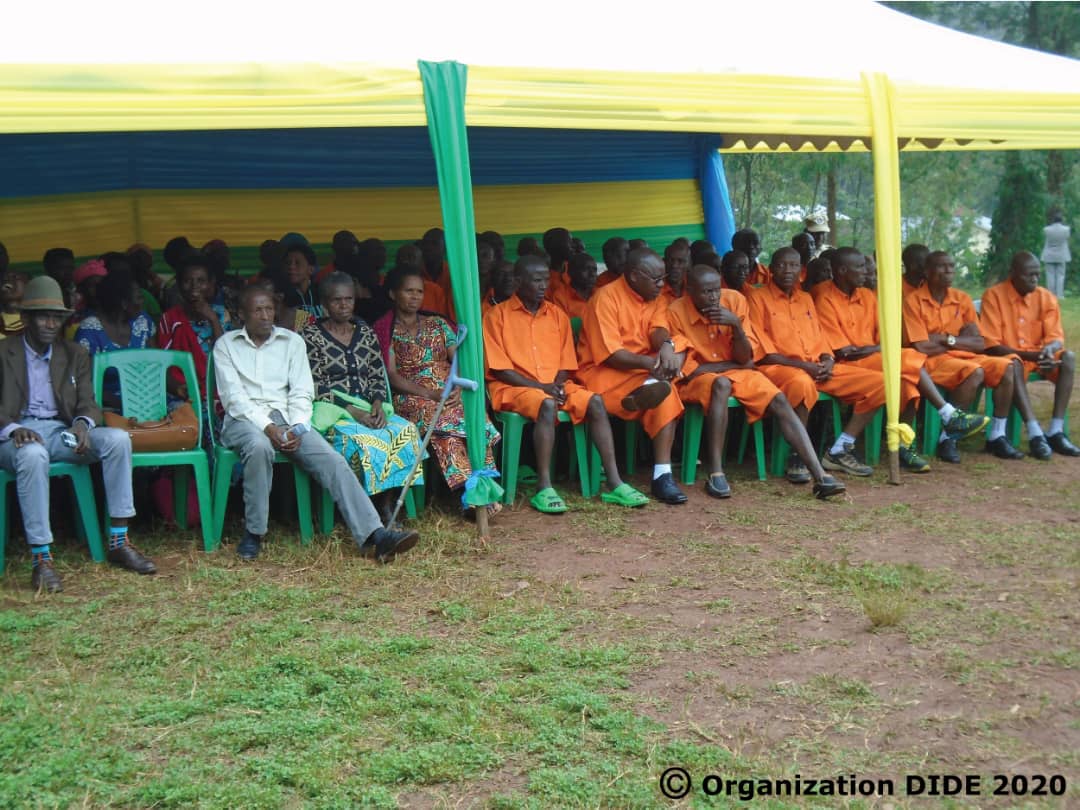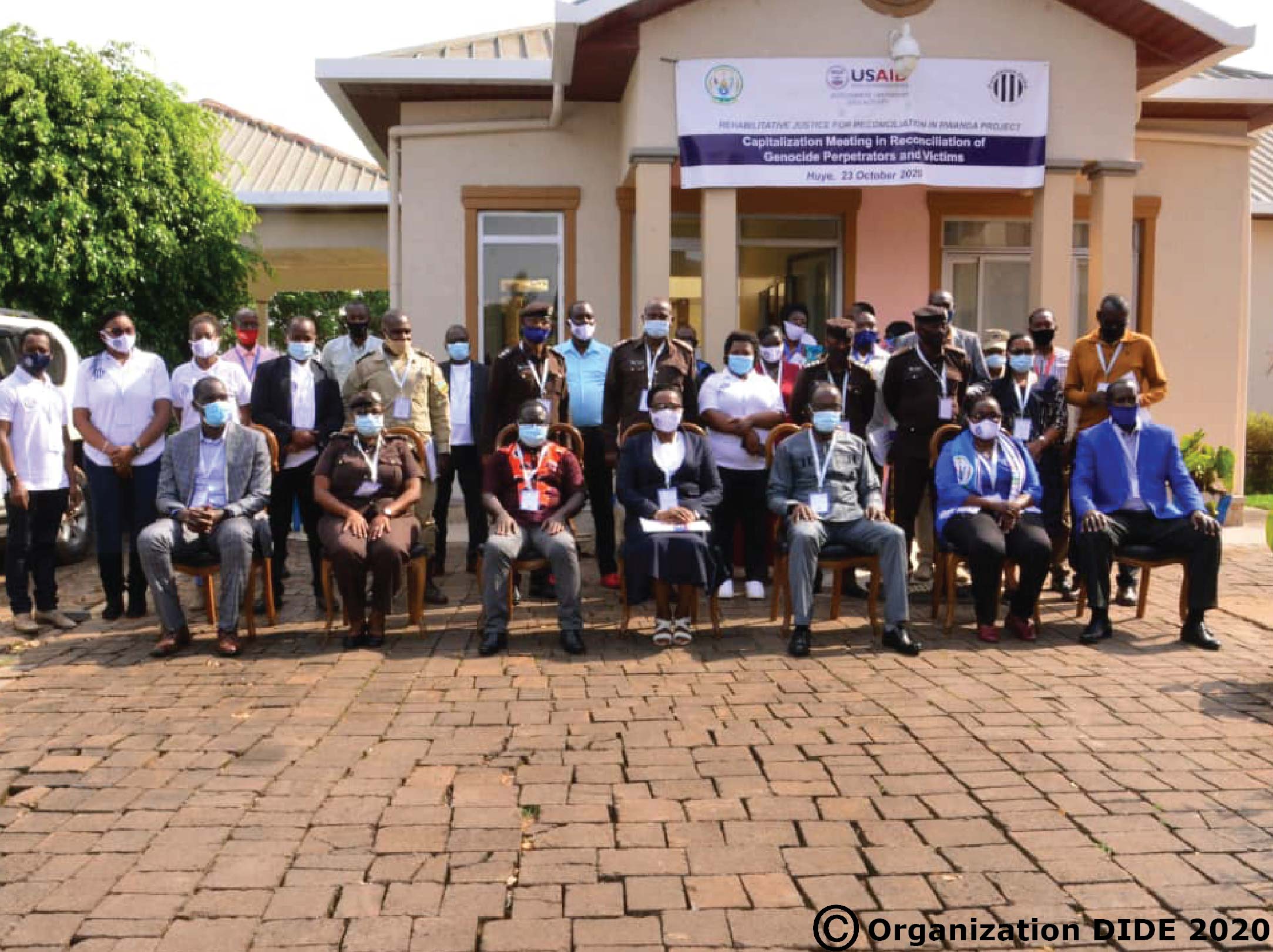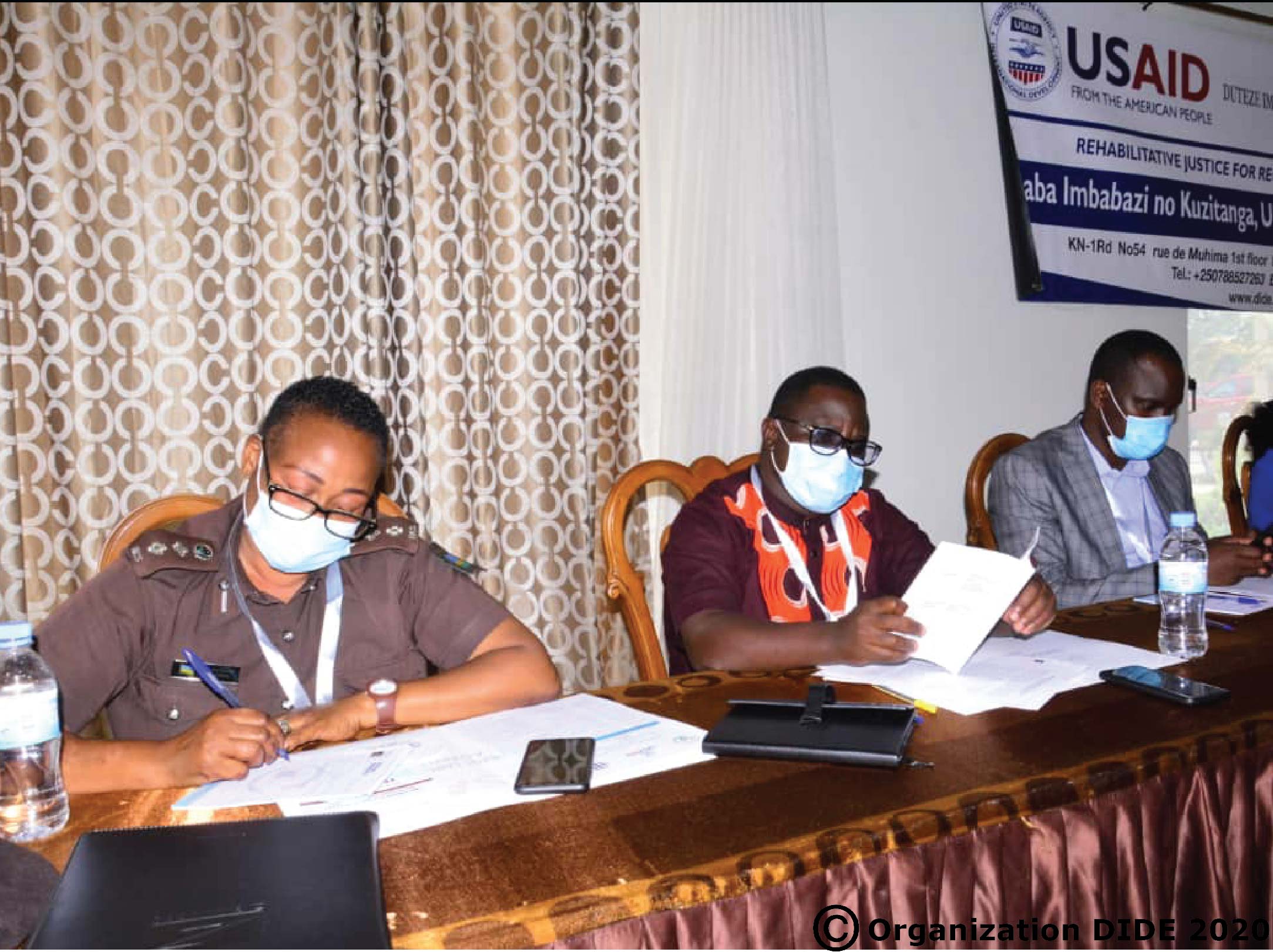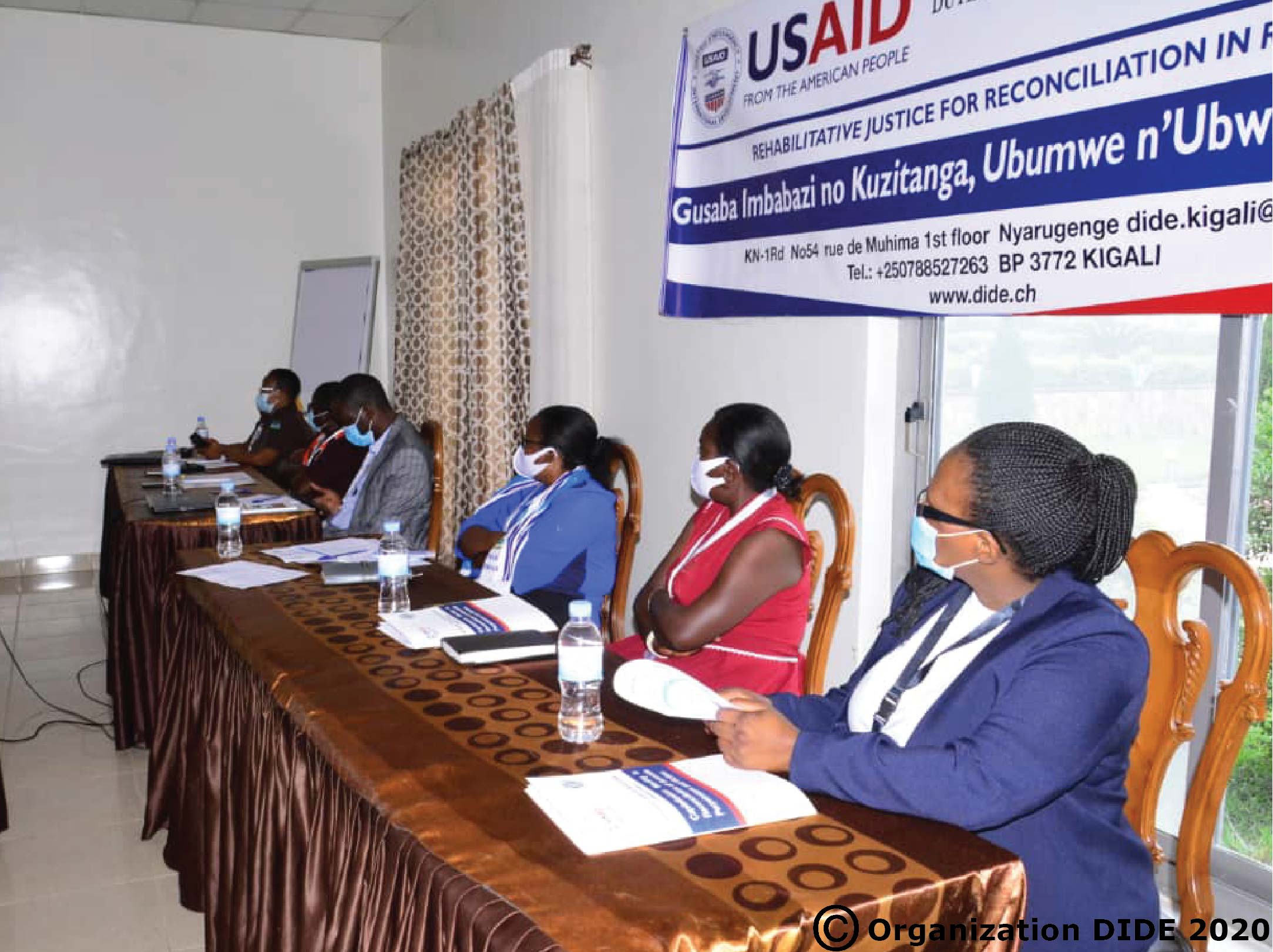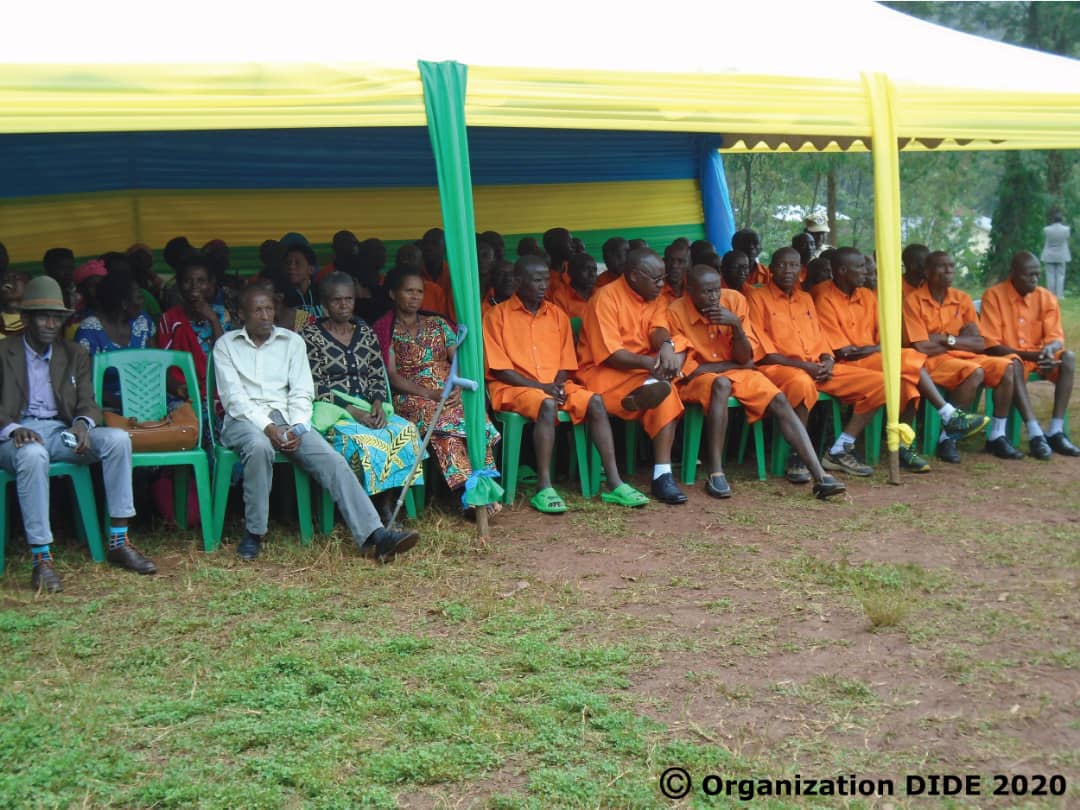Started in March 2019, this project called “Rehabilitative Justice for reconciliation in
Rwanda” aims to promote future social cohesion and peaceful coexistence between inmates about to be released and members of the future host community, between others, composed of survivors of the genocide and members of the families of the perpetrators.
The project targets 3 prisons in Rwanda, namely Huye, Nyamagabe and Rusizi
prisons and communities from Nyamasheke and Nyaruguru districts.
Initially planned for a period of 15 months, the project was extended to 18 months following the impact of the Covid-19 pandemic on the initial timetable. It is carried out with the financial and technical support of USAID / DUTEZE IMBERE UBUTABERA (DIU).
The establishment process was facilitated by volunteers who take care of the beneficiaries of the project on a daily basis with a view to accompanying them in their individual approach aimed at, for the detainees to ask for forgiveness and the granting of this forgiveness by the surviving victims of genocide.
The volunteers mentioned are, on one side, trained “peer educators”, selected prisoners who assist and accompany their inmates who have expressed a desire to ask for forgiveness and 15 who join therapeutic groups. On the other side, community volunteers/facilitators are trained to assist community members and accompany them in this process aimed at reconciliation by asking for and granting forgiveness.
Until March 2020, a total of 130 detainees had already asked for forgiveness, including 34 from Huye prison, 51 from Nyamagabe prison and 45 from Rusizi. 31 other inmates from Rusizi prison and 16 from Nyamagabe prison were ready to ask for forgiveness but the Covid 19 pandemic did not allow this to happen.
RECONCILIATION THROUGH FORGIVENESS
Since March 2019, Dignité en Détention (DIDE RWANDA) is implementing initially a 15 months modified to 18 months project called Rehabilitative Justice for reconciliation in Rwanda under the financial and technical support of USAID/ DUTEZE IMBERE UBUTABERA. The project is targeting 3 prisons of Rwanda, namely Huye, Nyamagabe and Rusizi and two districts:
Nyamasheke and Nyaruguru and is set up with a view to promoting social cohesion and peaceful coexistence between the soon-to-be released detainees from targeted prisons and community members, including genocide survivors, the family members of genocide perpetrators and globally with all community members from two districts of Rwanda.
Until March 2020, a total of 130 detainers already requested for forgiveness including 34 from Huye prison, 51 from Nyamagabe prison and 45 from Rusizi. Others 31 detainees from Rusizi prison and 16 from Nyamagabe prison are ready to request for forgiveness
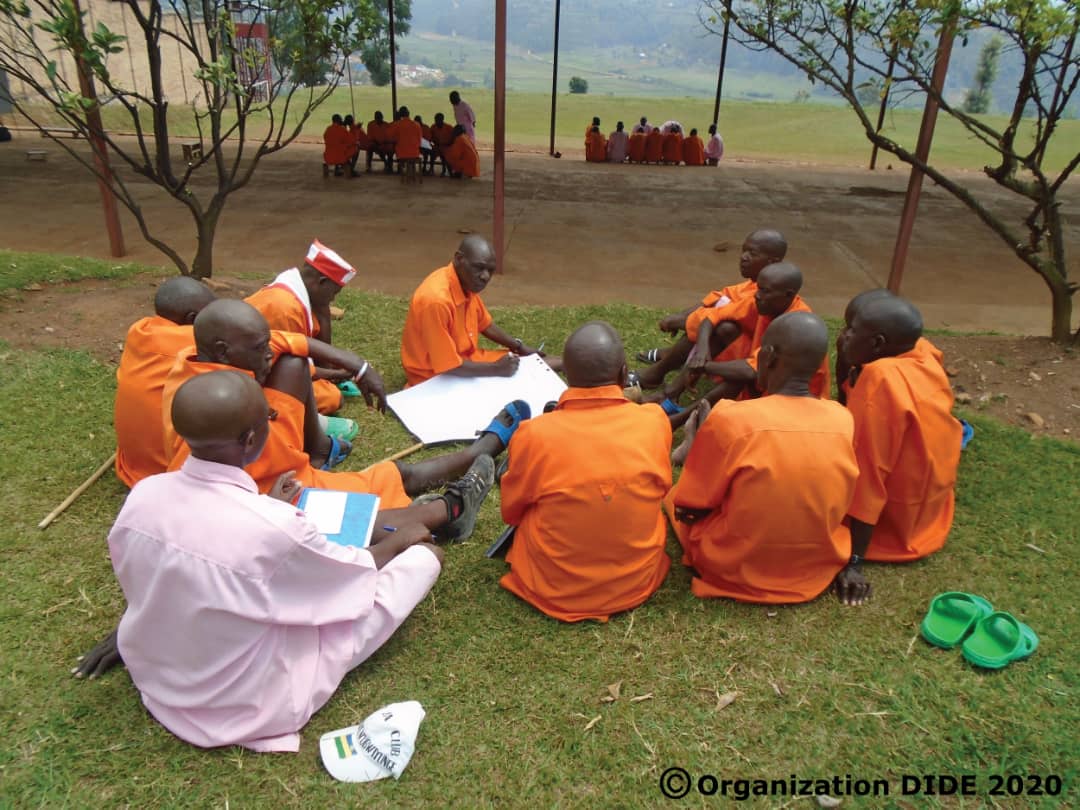
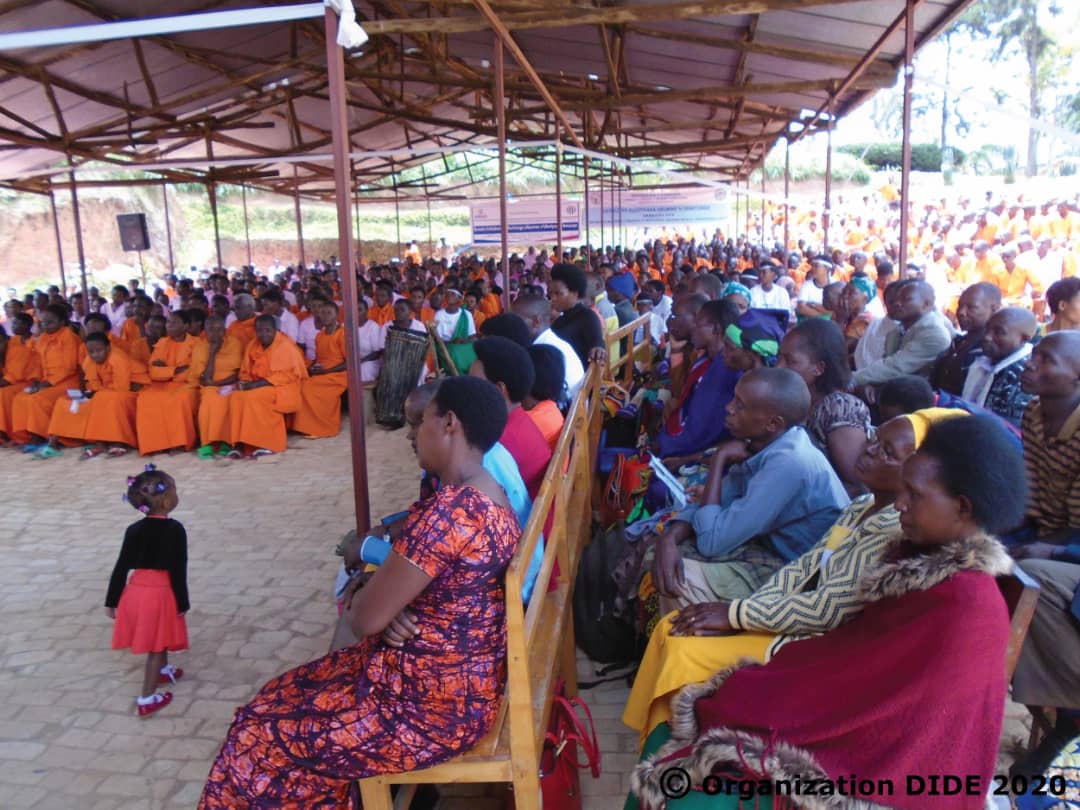
“Counseling” sessions in the therapeutic groups of prisoners in the prisons of Rusizi,
Huye and Nyamagabe.
The detainees accompanied in psychosocial counseling and healing sessions were those who were willing to follow a path to reconciliation sessions and join therapeutic groups.
In total, 437 inmates (including 328 men and 109 women) assisted by peer educators 90 were distributed in 34 groups.
To update the peer educators after the confinement period and insure a sustainability to the project, all peer educators received a fresher training. This was organized remotely in collaboration with RCS and prison authority
During the year 2019, many "counseling" sessions for therapeutic purposes as well as reconciliation sessions between detainees and victims, including those of the genocide, were conducted in Rusizi prison, for beneficiaries of the Nyamasheke district, in Huye prison for those of Nyaruguru district and in the women’s prison of Nyamagabe forprisoners hailing from the districts of Nyaruguru and Nyamasheke disricts.
During these reconciliation sessions, 132 victims granted pardon to these inmates, including 53 presented to Rusizi prison, 53 to Nyamagabe prison and 26 to Huye prison.
In total 94 inmates’ family members have been presented in those reconciliation events : 37 in Rusizi prison, 38 in Nyamagabe prison and 19 in Huye prison.
Activities during the confinement
During the confinement, activities of the project were conduct remotely: project focal points at prison level (Officers in charge of correction and education) were trained using Webex or Zoom platforms and they coordinated the group activities inside the prison compounds. They then reported to DiDe.
There were also meetings with RCS authorities, including Directors of the 3 Prisons covered by the Project.
Meetings with local authorities to agree on the project remaining activities
In August 2020, meetings were organized with concern prisons and districts aimed at
providing sufficient information to all stakeholders on the interventions in which they played a
role in one way or another. Meetings were planned before the closure of the project with the
intention of discussing how to ensure the sustainability of the intervention.
18
Different local authorities and community leaders who play a role in reconciliation attended the meetings.
Rapid assessment of the project
In October 2020, a rapid assessment of the achievements of the projecy was
organized as part of the phase-out strategy. This rapid assessment had to:
i) Identify the understanding of reconciliation process among beneficiaries
ii) Describe obstacles encountered in the reconciliation process and those still to be
overcome
iii) Define appropriate strategies to be used in improvement of further interventions
The assessment was conducted by a consultant who collected information in the project
documentation and interviewed various stakeholders (partners, direct and indirect
beneficiaries). A total of 36 persons directly involved in the project were met and they are
acknowledged for their availability and contribution.
2.3.3. Lessons learned and challenges
Succes stories:
![]() Due to group therapy, a lot of perpetrators who took part in the project have been
Due to group therapy, a lot of perpetrators who took part in the project have been
healed, rehabilitated and ready to confess their crimes.
![]() Perpetrators, who didn’t recognize their crimes during gacaca, pleaded guilty and most
Perpetrators, who didn’t recognize their crimes during gacaca, pleaded guilty and most
of them acknowledged all the crimes they committed.
![]() Some of the perpetrators revealed places where bodies of persons killed during the
Some of the perpetrators revealed places where bodies of persons killed during the
genocide against Tutsi are buried.
![]() Telling the truth and confessing contributed to the hope that genocide convicts, if
Telling the truth and confessing contributed to the hope that genocide convicts, if
released, will live in peace with other members of the community.
![]() Prison’s staffs benefited from trainings offered, and are committed to make good use of
Prison’s staffs benefited from trainings offered, and are committed to make good use of
the knowledge acquired in the interest of rehabilitative Justice for Reconciliation in
Rwanda.
![]() Facilitators in community appreciate trainings received on how to: communicate with
Facilitators in community appreciate trainings received on how to: communicate with
antagonist people, listening, respecting individual decision taking. They also
appreciate the role they played/their contribution in the unity and reconciliation, hence
in the development of the country.
![]() The project was described by beneficiaries as a robust bridge between perpetrators,
The project was described by beneficiaries as a robust bridge between perpetrators,
victims and community.
![]() Community facilitators reported that Covid 19 has been an obstacle because some
Community facilitators reported that Covid 19 has been an obstacle because some
persons they’ve worked with and were ready for dialogue could not meet their
counterparts.
8. Challenges noted in the project implementation
The short time allocated to the project and was disturbed by the COVIC_19 pandemic didn’t
allow:
![]() To connect physically all inmates who confessed their crimes to victims; - To assess the
To connect physically all inmates who confessed their crimes to victims; - To assess the
real motivations of demanding pardon and the sustainability of the community dialogues
initiated;
![]() To overcome the resistance on both sides: perpetrators to plead guilty for their crimes
To overcome the resistance on both sides: perpetrators to plead guilty for their crimes
and the victim to digest the confession and be ready to forgive.
The project generated or highlighted new necessities such as:
![]() The need for training nurses in charge of psychological support in prisons; - The need
The need for training nurses in charge of psychological support in prisons; - The need
to extend the Rehabilitative Justice for Reconciliation in Rwanda project experience in all
prisons and communities of Rwanda.
![]() Prison’s staff used in the project wishes more support and incentives. They also
Prison’s staff used in the project wishes more support and incentives. They also
recommend extending trainings to all prison’s staff to facilitate serving prisoners in
the line of the “Rehabilitative Justice for Reconciliation” concept.
